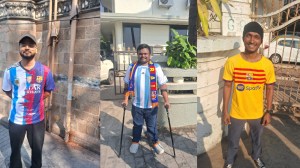World Mental Health Day on October 10: PGI to mentor eight states for T-MANAS initiative
T-MANAS will function as a 24x7 mental health facility across states, UTs
 PGI’s association of resident doctors organised a 5 km run from PGI Kairon Block to Sukhna Lake, to raise awareness about World Mental Health Day. As many as 500 participants were part of the run. Express
PGI’s association of resident doctors organised a 5 km run from PGI Kairon Block to Sukhna Lake, to raise awareness about World Mental Health Day. As many as 500 participants were part of the run. ExpressThe Covid-19 pandemic has had a huge impact on the mental and emotional health of people of all age groups and walks of life. To address this pressing need of the hour, the Centre has announced T-MANAS (Tele-Mental Health Assistance and Nationally Actionable Plan through States) to provide mental health support and interventions to people in remote and neglected areas.
The aim of the initiative, to be launched on World Mental Health Day (October 10) on Monday, is to set up at least one centre in each state and UT, a 24×7 facility, to reach out to people and provide immediate support for their psychological well-being.
“For this initiative PGIMER, Chandigarh, will be the mentoring centre for at least eight states, including Punjab, Haryana, and Leh-Ladakh (UT), and the team at each centre will comprise psychiatrists, psychologists, counsellors, audio-visual and computer operators working in three shifts to ensure a seamless and timely delivery of help and care to alleviate psychological distress of the callers, 24 hours a day,” says Dr Aseem Mehra, Assistant Professor, Department of Psychiatry, PGI.
The Institute had recently been approved as a collaborating centre of the World Psychiatric Association, which comprises 147 psychiatric societies across 121 countries, and PGI has become the second centre in India, the other being NIMHANS, Bengaluru.
“There will be a specified number of posts for each centre and the budget for each centre is about Rs 2 crore to buy desktops, internet connection, phone lines for connectivity and technical staff and if need be, we can ask for more budget,” adds
Dr Mehra. T-MANAS, believes Dr Mehra, will be an important step for crisis intervention of mental health, addressing stigma and raising awareness.
“Ninety per cent of people don’t come in the treatment net and there is a huge gap in those needing treatment and opting for it, and telemedicine can play a big role in reaching out to people and being the first line of contact. The first step is to identify the patient and their issues. PGI will provide support in logistics and patient care and step in for guidance and treatment at the Insitute, especially in complicated cases. Community participation is vital, especially in rural and far-flung
areas, where awareness about mental health is lacking.
“Also, many know they have a mental health issue, but don’t know how to ask for help, and
T-MANAS has the potential to connect many dots. We hope to identify patients by training the community like village sarpanches, who can motivate people to seek help…the vision is to link existing mental health services with medical colleges, district mental health programmes and health and wellness centres.
“There could be issues of connectivity, language and cultural barriers, but these can be overcome with time and experience. Both therapy and care are important for treatment and improving the quality of life and we just want to reach out to common people and let them know that help is just a call away,” Dr Mehra says.







